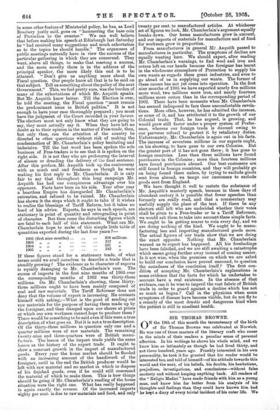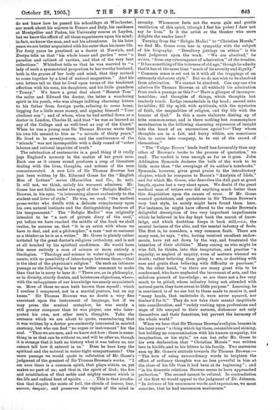do not know how he passed his schooldays at Winchester,
nor much about his sojourn in France and Italy, his residence at Montpellier and Padua, his University course at Leyden, but we know the effect of all these experiences upon his mind ; in fact, we know the man, and not his adventures. In his later years we are better acquainted with his outer than his inner life. For forty years he practised as a doctor at Norwich, and Evelyn tells us that " his whole house and garden" were " a paradise and cabinet of rarities, and that of the very best collections." Whitefoot tells us that he was married to " a lady of such a symmetrical proportion to her worthy husband, both in the graces of her body and mind, that they seemed to come together by a kind of natural magnetism." And his own letters tell us that he lived upon terms of the tenderest affection with his sons, his daughters, and his little grandson " Tomey." We know a great deal about " Honest Torn" the sailor and Edward the doctor, the latter a wandering spirit in his youth, who was always inditing charming letters to his father from foreign parts, refusing to come home, begging for a little more money, and signing himself "Your obedient son" ; and of whom, when he had settled down as a doctor in London, Charles II. said that " he was as learned as any of the College and as well-bred as any of the Court." When he was a young man Sir Thomas Browne wrote that his own life seemed to him as " a miracle of thirty years." He lived to be seventy-seven, and the continuance of the " miracle " was not incompatible with a daily round of "sober labours and rational inquiries of truth."
The celebration of centenaries is a good thing if it really jogs England's memory in the matter of her great men. Each one as it comes round produces a crop of literature dealing with the lives, thoughts, and actions of the men commemorated. A new Life of Sir Thomas Browne has just been written by Mr. Edmund Gosse for the "English Men of Letters" series (Macmillan and Co., 2s. net). It will not, we think, satisfy his warmest admirers. Mr. Gosse has not fallen under the spell of the " Relig,io Medici." Browne, in his eyes, "is interesting almost exclusively to the student and lover of style." He was, we read, "the earliest prose-writer who dwells with a delicate complacency upon his own natural instincts and the distinguishing features of his temperament." The " Religio Medici " was originally intended to be " a sort of private diary of the soul," yet before we have reached the middle of the book we shall realise, he assures us, that " it is an artist with whom we have to deal, and not a philosopher," a man "not so eminent as a thinker as he is as a writer." Mr. Gosse is plainly rather irritated by the great doctor's religious orthodoxy, and is not at all touched by his spiritual confidence. He would have him more entirely a man of science or more entirely a theologian. " Theology and science in water-tight compart- ments, with no possibility of interchange between them,—that is the ideal of the physician's religion." On such an intimate passage as the following he has no better comment to make than that he is sorry to hear it : " There are, as in philosophy, so in divinity, sturdy doubts, and boisterous objections, where- with the unhappiness of our knowledge too nearly acquainteth us. More of these no man hath known than myself ; which I confess I conquered, not in a martial posture, but on my knees." Sir Thomas Browns was no doubt a very fine executant upon the instrument of language, but if we may press the musical metaphor, he was surely a still greater composer than he was player, one who inter- preted his own, not other men's, thoughts. Take the sentence which we are about to quote, remembering that it was written by a doctor pre-eminently interested in morbid anatomy, but who can find "no organ or instrument" for the souL " Thus we are men, and we know not how ; there is some- thing in us that can be without us, and will be after us, though it is strange that it bath no history what it was before us, nor cannot tell how it entered in us." Does he here keep the spiritual and the natural in water-tight compartments ? One more passage we would quote in refutation of Mr. Gosse's judgment of the greatest of Sir Thomas Browne's works. " I am sure there is a common spirit, that plays within us, yet makes no part of us ; and that is, the spirit of God ; the fire and scintillation of that noble and mighty essence which is
the life and radical heat of spirits. . . . This is that irradia- tion that dispels the mists of hell, the clouds of horror, fear, sorrow, despair; and preserves the region of- the mind in
serenity. Whosoever feels not the warm gale and gentle ventilation of this spirit, (though I feel his pulse) I dare not say he lives." Is it the artist or the thinker who more delights the reader here?
Turning from the " Religio Medici" to "Christian Morals," we find Mr. Gosse even less in sympathy with the subject of his biography. "Desultory jottings on ethics" is his final judgment upon the work. " We are absolved," he writes, "from any extravagance of admiration" of the treatise. "It has something of the triteness of old age," though he admits that it has at the same time " much of its serenity and dignity." " Common sense is set out in it with all the trappings of an extremely elaborate style." But we do not wish to be absolved from admiration. We cannot be absolved. Can any one who admires Sir Thomas Browne at all withhold his admiration from such a passage as this ?—" Have a glimpse of incompre- hensibles ; and thoughts of things, which thoughts but tenderly touch. Lodge immaterials in thy head ; ascend unto invisibles ; fill thy spirit with spirituals, with the mysteries of faith, the magnalities of religion, and thy life with the honour of God." Is this a mere elaborate dishing up of trite common-sense, and is there nothing but commonplace moralisation in the following charming expression of insight into the heart of an unconscious egoist ?—" They whose thoughts are in a fair, and hurry within, are sometimes fain to retire into company, to be out of the crowd of themselves."
"The Vulgar Errors' lends itself less favourably than any other of Browne's books to the process of quotation," we read. The verdict is true enough so far as it goes. John Addington Symonds declares the bulk of the work to be little more than "the sweepings of its author's notebooks." Symonds, however, gives great praise to the introductory chapter, which he compares to Bacon's "Analysis of Idols," and for which Mr. Gosse, who describes the dull part at great length, spares but a very short space. We doubt if the great medical man of letters ever did anything much better than this disquisition upon the causes of error. If Mr. Gosse wanted quotations, and quotations in Sir Thomas Browne's very best style, he surely might have found them here. For instance, he might have offered to the reader Browne's delightful description of two very important impediments which he believed in his day kept back the march of know- ledge, and which doubtless keeps it back still,—i.e., the mental laziness of the able, and the mental industry of fools. The first is, he considers, a very common fault. There are many men, he says, " who, having received excellent endow- ments, have yet sat down by the way, and frustrated the intention of their abilities." Many among us who might be wise fall, he thinks, into this temptation, and practise "a supinity, or neglect of enquiry, even of matters whereof we doubt; rather believing than going to see, or doubting with ease and gratis than believing with difficulty or purchase." On the other hand, " as there are many great wits to be condemned, who have neglected the increment of arts, and the sedulous pursuit of knowledge ; so are there not a few very much to be pitied, whose industry being not attended with natural parts, they have sweat to little purpose." Learning, he is convinced, is of no use but to those made to receive it, and " many heads, that undertake it, were never squared, nor timber'd for it." They do not take their mental ineptitude into consideration, and " rudely rushing upon professions and ways of life unequal to their natures, dishonour not only themselves and their functions, but pervert the harmony of the whole world."
When we bear that Sir Thomas Browne's religion became in his later years " a thing which lay there, ostensible and shining, but holding no communication with his human sympathy, his imagination, or his style," we can but refer Mr. Gone to his own declaration that " Christian Morals " was written late in his life, and to his letters to his family. Two sentences sum up Mr. Gosse's attitude towards Sir Thomas Browne :— " The love of using extraordinary words to heighten the effect of ordinary thoughts was no less powerful in him at the close of his life than it had been at its beginning" ; and "in his domestic relations Browne seems to have approached perfection." The second cannot be refuted. In contradiction of the first we would appeal to the judgment of Dr. Johnson. " In defence of his uncommon words and expressions, we must consider, that he had uncommon sentiments."



















































 Previous page
Previous page